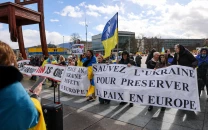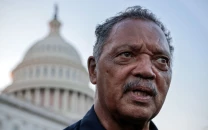Tillerson gives nod to acting on climate at Arctic meet
Tillerson's signing of the document surprised a source close to the State Department

US Secretary of State Rex Tillerson delivers remarks to the employees at the State Department in Washington, US, May 3, 2017. PHOTO: REUTERS
Trump's efforts to dilute US climate policies have made the country an outlier on the issue and put Tillerson in an awkward position at a meeting of the Arctic Council. The council meets every two years to tackle climate change and other problems facing the North.
The Arctic is warming at a faster pace than any other part of the world, forcing native villagers on coasts and rivers in the region to move to higher ground as permafrost and glaciers melt and seas rise. Global warming also puts stress on wildlife such as walruses and polar bears as they lose their habitat areas.
Climate talks under shadow of Trump threats
The Arctic agreement Tillerson signed with foreign ministers from the other seven nations of the council, including Russia, Canada and Norway, made only a passing reference to the Paris pact. It noted "entry into force" of the pact and its implementation and called for global action to reduce greenhouse gas pollution.
Still, Tillerson's signing of the document surprised a source close to the State Department. "We'd heard ... that there would likely be a significant US effort to redline or even remove entirely the Paris and climate language," said the source, who spoke on condition of anonymity due to the sensitive nature of the talks.



















COMMENTS
Comments are moderated and generally will be posted if they are on-topic and not abusive.
For more information, please see our Comments FAQ